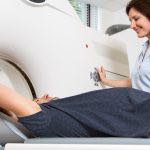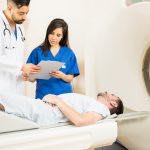A computed tomography (CT) scan is a diagnostic imaging test used to examine the bones, organs, blood vessels, and soft tissues inside the body. During a CT scan, x-rays are taken from many different angles. Then, a computer combines the images to create a cross-sectional picture. This process can be repeated multiple times to create a three-dimensional image of the inside of the body.
CT scans can give insight into the condition of your soft tissues, organs, blood vessels, and bones. The series of images taken during this scan give physicians a clearer view of these structures than a normal x-ray. A CT scan can be used to diagnose and monitor bone and joint problems as well as certain cancers and diseases. It is also used to detect internal bleeding and blood clots.
CT scans are painless procedures that are typically done at outpatient centers. You will be awake for the scan, which can last anywhere from 5 minutes to 30 minutes. CT scan side effects are rare, and most patients are able to go home immediately after the procedure. Your physician will be able to interpret your results immediately. If you visited an imaging center for your scan, a radiologist will examine the images and send the results to your physician.
Are there alternatives to a CT scan?
A CT scan creates detailed images of the inside of your body. These images help your physician diagnose and monitor a wide number of conditions. If your doctor tells you that you need a CT scan, it’s probably because it is the best imaging test for your situation. There are two alternatives to a CT scan. However, you’ll want to check with your doctor to see if either are a good option for you
- Magnetic Resonance Imaging — Magnetic resonance imaging (MRI) is an imaging test that uses radio waves and large magnets to take detailed images of the body’s organs and internal structures without the ionizing radiation needed for x-rays and CT scans.
- X-Ray — An x-ray is an imaging test that allows physicians to see two-dimensional images of a patient’s bones and soft tissues. X-ray images are not as detailed as those from other imaging tests.
The type of procedure you get will depend on your personal health and your doctor’s recommendations. You can always ask your doctor why they’re recommending any procedure. If you’re unsure about their recommendations, feel free to get a second opinion.
How much should you pay for your CT scan?
Finding a fair cost for you CT scan can be challenging. There are many factors that can affect how much you pay. These include where you live, whether you’re insured or not, and who you choose to perform your scan. New Choice Health can help you understand how these variables impact the cost of your scan. You can then use the information available to find the best price for your procedure. Visit the New Choice Health CT scan cost page to learn how to find a fair price for your CT scan today.







